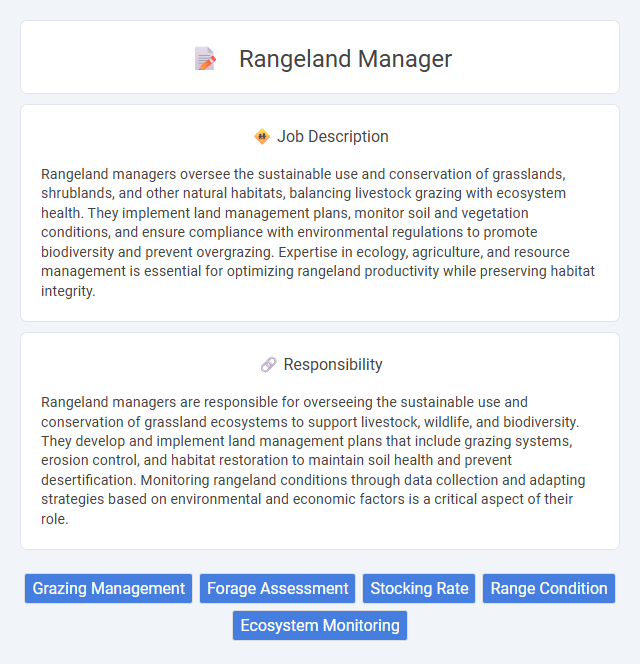
Rangeland managers oversee the sustainable use and conservation of grasslands, shrublands, and other natural habitats, balancing livestock grazing with ecosystem health. They implement land management plans, monitor soil and vegetation conditions, and ensure compliance with environmental regulations to promote biodiversity and prevent overgrazing. Expertise in ecology, agriculture, and resource management is essential for optimizing rangeland productivity while preserving habitat integrity.
Individuals with a strong interest in ecology and outdoor work will likely find a rangeland manager position suitable, as it demands physical stamina and a passion for land stewardship. Those comfortable with technical data analysis and fieldwork probably have a good chance of success in this role. People who prefer routine office tasks or limited physical activity may not find this job as well-suited to their preferences.
Qualification
A Rangeland Manager must possess a degree in natural resource management, environmental science, or agriculture, with specialized knowledge in rangeland ecology, soil science, and wildlife habitat management. Proficiency in geographic information systems (GIS), environmental regulations, and sustainable land use practices is essential for effective ecosystem stewardship. Strong analytical skills and experience in grazing management, restoration techniques, and data collection enhance decision-making and resource optimization on public and private rangelands.
Responsibility
Rangeland managers are responsible for overseeing the sustainable use and conservation of grassland ecosystems to support livestock, wildlife, and biodiversity. They develop and implement land management plans that include grazing systems, erosion control, and habitat restoration to maintain soil health and prevent desertification. Monitoring rangeland conditions through data collection and adapting strategies based on environmental and economic factors is a critical aspect of their role.
Benefit
Rangeland managers likely enjoy benefits such as opportunities for outdoor work, contributing to environmental sustainability, and involvement in land conservation efforts. The role probably offers a balance between physical activity and scientific analysis, appealing to those who value both hands-on and intellectual challenges. Job stability and potential for advancement in natural resource management sectors also seem probable benefits.
Challenge
Rangeland manager roles likely involve navigating complex ecological challenges such as balancing land use with conservation efforts and mitigating the impact of climate variability on vegetation health. They probably face difficulties in managing invasive species and ensuring sustainable grazing practices while addressing stakeholder interests. The position may require adaptability to changing environmental regulations and unpredictable weather patterns that affect land productivity.
Career Advancement
Rangeland managers oversee the sustainable use and conservation of grasslands, which offers diverse career advancement opportunities in natural resource management, environmental consulting, and governmental agencies such as the Bureau of Land Management. Developing expertise in ecosystem restoration, wildlife habitat management, and remote sensing can lead to senior roles like regional manager or policy advisor. Continuous education and certifications, such as the Certified Rangeland Professional (CRP), enhance prospects for leadership positions and influence in land-use planning and conservation strategies.
Key Terms
Grazing Management
Rangeland managers specializing in grazing management develop and implement sustainable grazing plans to optimize forage utilization while protecting soil and vegetation health. They assess rangeland conditions, monitor livestock impacts, and adjust stocking rates to maintain ecosystem balance and prevent overgrazing. Expertise in vegetation dynamics, animal behavior, and grazing patterns is essential for enhancing rangeland productivity and biodiversity.
Forage Assessment
Forage assessment is a critical responsibility for a Rangeland Manager, involving the evaluation of plant biomass and nutritional quality to ensure sustainable grazing practices. Using tools like remote sensing, vegetation sampling, and growth modeling, the manager estimates forage availability and monitors ecosystem health. Accurate forage assessment supports decision-making on stocking rates, seasonal grazing adjustments, and restoration efforts to maintain rangeland productivity and biodiversity.
Stocking Rate
Rangeland managers calculate and adjust the stocking rate to balance livestock numbers with forage availability, ensuring sustainable grazing practices that prevent overgrazing and land degradation. Proper stocking rate management optimizes rangeland productivity, maintains ecological health, and supports biodiversity by aligning grazing intensity with the carrying capacity of the land. Monitoring forage growth, soil conditions, and animal impact allows rangeland managers to make data-driven decisions that enhance rangeland resilience and long-term viability.
Range Condition
Rangeland managers assess and monitor range condition by evaluating soil health, vegetation diversity, and forage availability to ensure sustainable grazing practices. They implement management plans that promote ecosystem resilience, prevent overgrazing, and enhance wildlife habitats. Utilizing data-driven tools and field surveys, rangeland managers optimize land productivity while maintaining ecological balance.
Ecosystem Monitoring
Rangeland managers specializing in ecosystem monitoring utilize advanced remote sensing technologies and geographic information systems (GIS) to assess vegetation health, soil conditions, and wildlife habitats. They collect and analyze data on plant biodiversity, forage quality, and erosion rates to guide sustainable land use practices and prevent desertification. These professionals implement adaptive management strategies based on continuous ecological assessments to maintain ecosystem resilience and promote biodiversity conservation.
 kuljobs.com
kuljobs.com